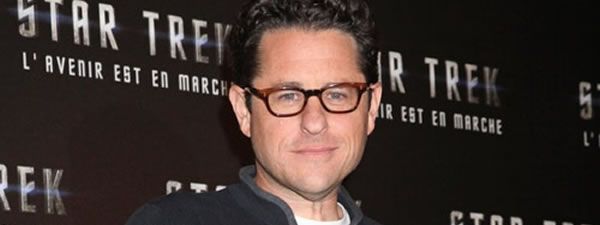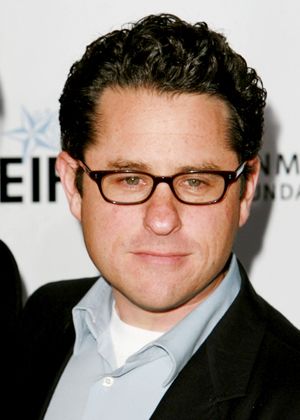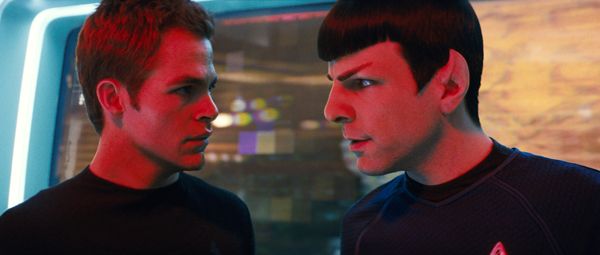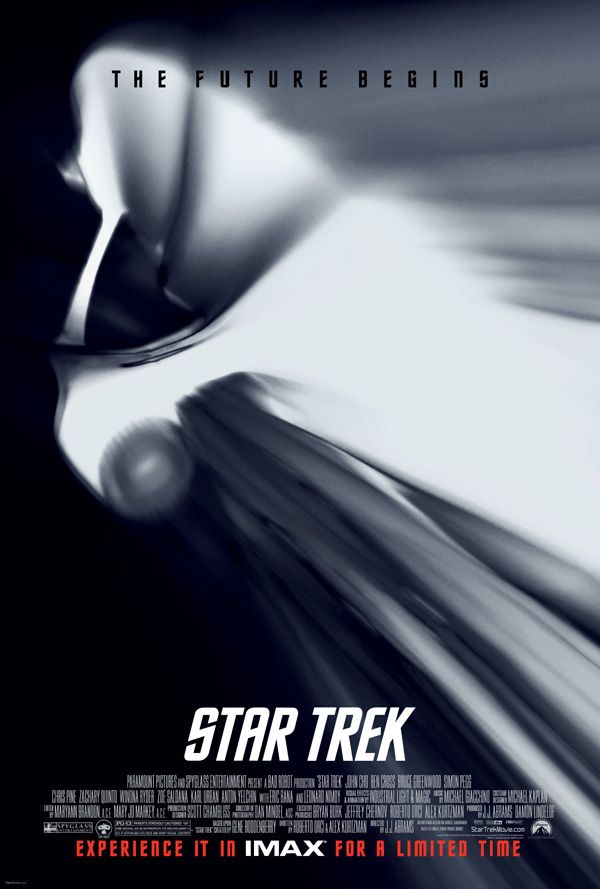The phenomenally successful re-imagining of the legendary adventures captured in Star Trek will be coming to DVD and Blu-Ray on November 17th. Although it is too early to talk about the specifics of the special features and extras that will be included on the 2-disc DVD and 3-disc Blu-Ray, in speaking to members of the press this afternoon at the Viceroy Hotel in Santa Monica, writer/director/producer J.J. Abrams gave some insight into the plans for the forthcoming Star Trek sequel, the possibility of it being done in 3-D and what he sees his involvement with the franchise being, for the foreseeable future. And, with so many other projects on his schedule, the prolific storyteller also touched on Mission: Impossible 4, Fringe and his latest television pilot, just sold to NBC. Hit the jump to read what he said:
And in case you missed it, we posted a new interview with writer/producers Robert Orci and Alex Kurtzman from the same event here. They talked about writing the "Star Trek" sequel, "Cowboys and Aliens", the "View-Master" movie, "Fringe", and a lot more. Here's J.J.
Question: Since you got to wipe the slate clean with your first Star Trek film, do you have any intention of using some of the old creatures or monsters, or do you plan to just bring in a whole new thing?
J.J.: In going forward, the fun of this movie series is that we will have the opportunity, given its alternate timeline, to cross paths with any of the experiences, places and characters that existed in the original series, but we have to be really careful, doing that. I don't want to do something that is so inside that only die-hard fans will appreciate. We're just now working on the script and just beginning the process of story breaking, but I guarantee you, whatever the story is and whatever the final movie ends up being, I know it will be something that will work on its own terms and be something that you don't need to know and study Star Trek to get, but if you are a fan, there will hopefully be gift after gift of connections, references and characters that you hold near and dear. At least, that's the intent.
How far ahead do you envision your involvement with the franchise? Is it a movie-by-movie basis for you, or do you see yourself involved with it for the foreseeable future?
J.J.: That's a wonderfully optimistic question and I appreciate that, but the answer is that it's obviously just movie-to-movie. The fact that we are now actively discussing the second film is surreal and very nice, and I'm thrilled. I hope that that results in something worthy of your time. But, it's one of those things that you just don't know. And so, I cannot presume it's gonna be a series that goes beyond those. Do we have ideas for a few movies and have we discussed them? Of course. You can't help but go, "Oh, it would be really cool, if we could do this, or if we can set that up there?" You throw those things around. But, we can't presume it's going to be anything more than now another film that we're lucky enough to do.
Leonard Nimoy recently said that a Star Trek sequel might not need him anymore. What is your reaction to that?
J.J.: I can't imagine a Star Trek movie not needing him. I'm sure that what he's saying is a combination of modesty and honesty. He may actually feel that way. But, the truth is, we could never have made this movie without him, and working with him again would be a joy. It is clearly too early, given that we are just now talking story, to conclude whether or not Spock Prime is in the film or not. Do I want to work with him again? Of course, 100%. I'd love to.
What are your plans for him on Fringe, beyond this week's episode?
J.J.: In terms of his role as William Bell, none of us could believe our luck that we convinced him to say yes to being on the show. He is wonderful on the show. And, I will say that this is not the last you will see of his character.
On this week's episode, William Bell gets to have a meeting with Olivia (Anna Torv). Will viewers get to see him face off with Walter Bishop (John Noble)?
J.J.: I don't want to give anything away, but this is not the last you'll see of him. He is so good and so wonderful to work with that I wouldn't limit the possibilities of what he'll get to do.
Any thought of Leonard Nimoy reprising the role of Paris in Mission: Impossible 4? Can you rule that out?
J.J.: How cool would that be? I just got a call that Peter Graves is in great shape, which would be a very bizarre bend in the space-time continuum, for obvious reasons. I almost feel like you could make him serious again and bringing him back. Whether it's Nimoy, who I have an incredible affinity for, or Graves, or anyone, we'll see. I actually tried to get Martin Landau in Mission 3, in a very small little moment just for fun, and was told that he had no interest in doing it. But then, when I met him, after the movie came out, it was the greatest thing. We were at this restaurant in New York, for one of the TV Upfront parties, and someone introduced me to Landau. They took me over and Martin Landau came over to me, extended his hand, and [pretended to lift his face off]. That was the greatest thing I'd ever seen.
You managed to contemporize what was an aging franchise, with your work on Star Trek, and you talked about including more current events in the sequel. Do you think that Star Trek is something that needs to be continuously updated for each generation?
J.J.: It's hard to give a blanket answer to that question. I do think that, whether it's Star Trek or anything, whatever is being investigated, created or produced now, in movies or TV, needs to consider the context in which it is being distributed. It's not a vacuum. There are certain universal themes of love, conflict, loyalty or family that are everlasting and that need to be presented in a way that makes it feel relevant, even if it's a period piece. You need to consider what context that film, that story and those characters are being seen in.
But, having said that, with Star Trek, it's not like we're looking to make the second movie some kind of heavy political allegory. I think that it's important that there is metaphor to what we know and that there is relevance, and I think allegory is the thing that made shows like The Twilight Zone and Star Trek resonate and still be vital today. But, because the first movie was so much about introducing these people, and it was very much a premise movie about how to bring these people together, it made it difficult to also have the film go as deep as it could, about certain conflict, certain relationships and the heart of who some of these characters are. I think it was successful in what it needed to do, to introduce these people, but I feel like, now that we've done that, it is the job of the next film to go a little bit deeper. It shouldn't be any less fun or take itself too seriously, but consider who these people are now and grow with them, and just examine them a little more closer, now that we've gotten through the pleasantries and introductions.
With everything you have going on, for the next couple months, what will you be focusing on mostly?
J.J.: Jeff Pinkner and Joel Wyman are running Fringe very well. We're still very involved in that, but they're running that. We have a new series, that we just sold to NBC, that we're going to be producing. It's a pilot. And, there's a movie that I'm writing that I would love to direct, early next year, so we'll see if that comes to fruition. There's a movie, called Morning Glory, that's coming out next year, with Harrison Ford, Rachel McAdams and Diane Keaton, that's being edited now. Roger Michell directed that. And, we're obviously hard at work on Star Trek 2 and Mission: Impossible 4. There's a lot that we're working on.
Any chance of you shooting the next Star Trek film in 3-D?
J.J.: Paramount talked to me about doing the first one in 3-D and, having it only be my second film, I was petrified just at the addition of it. I thought it would be another dimension of pain-in-the-ass. I was just like, "I want to make a decent 2-D movie." I was so worried that, instead of being a decent 2-D movie, it would have been a bad 3-D one. I'm open to looking at it 'cause now I feel a little bit more comfortable. And, if I, in fact, direct the Star Trek sequel, 3-D could be really fun, so I'm open to it. What I've seen of Avatar makes me want to do it because it's so crazy-cool looking.
And in if want more on the ""Star Trek" sequel, here's writer/producers Robert Orci and Alex Kurtzman from the same event. They also talked about "Cowboys and Aliens", the "View-Master" movie, "Fringe", and a lot more.






.jpg)